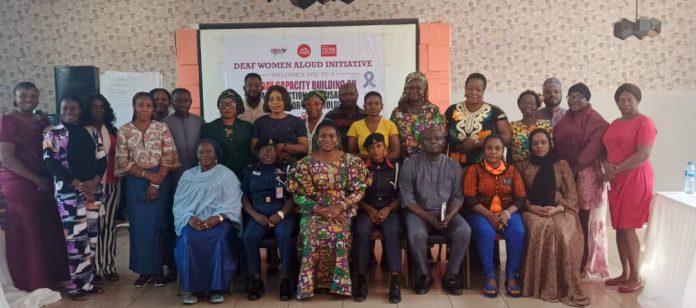In a bold move to tackle stigma and promote disability inclusion, the Deaf Women Aloud Initiative (DWAI) organized a transformative one-day training workshop on November 28, 2024. Held in Abuja, the event convened 33 participants—25 women and 8 men—from key government ministries, departments, and organizations. The training, rich in engagement and purpose, sought to demystify misconceptions about disabilities, reduce stigma, and create a unified advocacy platform for a more inclusive Nigeria.
Setting the Stage for Change
The workshop opened with an inspiring address by DWAI’s Executive Director, Mrs. Hellen Beyioku-Alase, who highlighted the urgency of creating an inclusive society. “For too long, Deaf women and girls, along with others living with disabilities, have faced barriers in accessing essential services like healthcare, legal aid, and financial support. It’s time to change the narrative,” she said passionately. Mrs. Beyioku-Alase urged attendees to be proactive champions of disability inclusion within their organizations and communities.
Her call to action set the tone for an intensive day of learning, reflection, and commitment. Through a carefully curated mix of lectures, group activities, and plenary discussions, participants were challenged to confront their biases, reframe their perspectives, and commit to creating a stigma-free environment for persons with disabilities.
Unpacking Values and Beliefs
The day’s first session, “Values and Beliefs,” delved into how personal attitudes shape perceptions and interactions with people with disabilities. Facilitators encouraged participants to reflect deeply on their own values, guiding them to recognize how unconscious biases can perpetuate discrimination.
In small groups, attendees shared experiences, discussed the root causes of stigma, and brainstormed strategies to foster empathy. “This session opened my eyes to how my beliefs may unconsciously affect my decisions,” admitted a senior officer from a government ministry. “It’s a wake-up call to be more intentional about inclusion.”
Redefining Disability Inclusion
The second session shifted the focus to practical steps for inclusion. Participants explored common misconceptions and outdated labels used to describe persons with disabilities. They were then introduced to accurate, respectful terminologies, underscoring the power of language in shaping societal attitudes.
One participant, a legal practitioner, noted, “Language matters more than we realize. Words can either build bridges or erect barriers. Today, I learned to choose my words wisely.”
The session also provided a comprehensive overview of the different types of disabilities—cognitive, physical, sensory, and psychosocial. Group discussions further reinforced the importance of adopting respectful and inclusive communication practices.
The Emotional Impact of Fatima’s Story
A poignant moment of the workshop came during the final session, which featured Fatima’s story. The narrative of a young girl with a disability who endured neglect and discrimination left a profound impact on the participants.
As the story unfolded, the room grew solemn, with many visibly moved by the tragic realities Fatima faced. The session served as a stark reminder of the devastating consequences of societal biases and the collective responsibility to address them.
“This story struck a chord in me,” said one participant. “It’s unacceptable that people with disabilities continue to face such challenges in this day and age. We must do better.”
Commitment to Action
By the end of the workshop, participants expressed a renewed understanding of disability issues and a firm commitment to driving change. Many pledged to implement inclusive practices within their workplaces and advocate for the rights of persons with disabilities.
“This training has been eye-opening,” said a participant from a federal ministry. “It’s not just about being aware of the issues; it’s about taking action. And I’m ready to be part of the change.”
A Vision for the Future
For DWAI, the success of the workshop marks just the beginning of a broader campaign to combat stigma and foster inclusion. “Our hope is that today’s participants become ambassadors of change,” said Mrs. Beyioku-Alase. “If each of them carries forward what they’ve learned, we can create ripples of impact across Nigeria.”
As the participants departed, armed with newfound knowledge and a sense of purpose, it was clear that the training had planted the seeds for a more inclusive future. The Deaf Women Aloud Initiative remains resolute in its mission, proving that with education, empathy, and advocacy, stigma can be dismantled, and inclusion can thrive.
Towards an Inclusive Nigeria
This workshop stands as a testament to the power of collective action in addressing societal challenges. As Nigeria continues its journey toward inclusivity, DWAI’s efforts serve as a vital reminder: true progress begins with understanding, and understanding starts with conversations like these.
With the commitment and resolve shown at this event, the dream of a society where persons with disabilities are valued, respected, and included seems closer than ever before.
Follow our channel on WhatsApp platform, click the link below:


